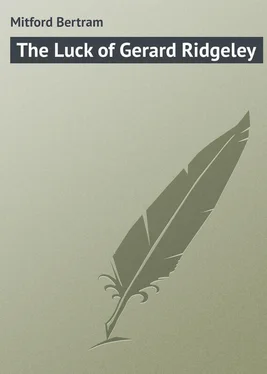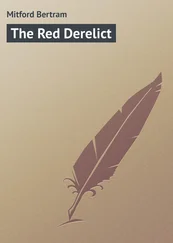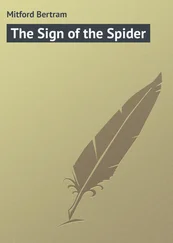Bertram Mitford - The Luck of Gerard Ridgeley
Здесь есть возможность читать онлайн «Bertram Mitford - The Luck of Gerard Ridgeley» — ознакомительный отрывок электронной книги совершенно бесплатно, а после прочтения отрывка купить полную версию. В некоторых случаях можно слушать аудио, скачать через торрент в формате fb2 и присутствует краткое содержание. Жанр: foreign_prose, на английском языке. Описание произведения, (предисловие) а так же отзывы посетителей доступны на портале библиотеки ЛибКат.
- Название:The Luck of Gerard Ridgeley
- Автор:
- Жанр:
- Год:неизвестен
- ISBN:нет данных
- Рейтинг книги:5 / 5. Голосов: 1
-
Избранное:Добавить в избранное
- Отзывы:
-
Ваша оценка:
- 100
- 1
- 2
- 3
- 4
- 5
The Luck of Gerard Ridgeley: краткое содержание, описание и аннотация
Предлагаем к чтению аннотацию, описание, краткое содержание или предисловие (зависит от того, что написал сам автор книги «The Luck of Gerard Ridgeley»). Если вы не нашли необходимую информацию о книге — напишите в комментариях, мы постараемся отыскать её.
The Luck of Gerard Ridgeley — читать онлайн ознакомительный отрывок
Ниже представлен текст книги, разбитый по страницам. Система сохранения места последней прочитанной страницы, позволяет с удобством читать онлайн бесплатно книгу «The Luck of Gerard Ridgeley», без необходимости каждый раз заново искать на чём Вы остановились. Поставьте закладку, и сможете в любой момент перейти на страницу, на которой закончили чтение.
Интервал:
Закладка:
His listeners thought this last statement hardly borne out by the aspect of the surroundings in general. The other, quick to see this, went on.
“Ah, you think it don’t look much like it, eh? Well, I don’t wonder. But, you see, it isn’t worth my while bothering about tinkering up this place. Here it doesn’t matter how one lives. But I’m just waiting till I’ve made my pile, and then – ” And the concluding blank left scope for the most magnificent, if somewhat vague possibilities.
They returned indoors, and Anstey made the heat and the walk an excuse for another glass of grog. Then a native knocked at the door to announce that the missing steed had been found and brought back. Harry suggested that it was time to start on their return ride to Maritzburg. But of this their host would not hear.
“Stay the night, anyhow,” he said. “That is, if you don’t mind roughing it. I can knock you up a shakedown of some sort. I meant to have had the spare room arranged when I first heard you were coming out, Gerard. But I dare say you can manage without white sheets.”
Gerard, of course, declared that, if anything, he rather preferred it. That point settled, Anstey became even more the effusively genial host; but, with all his desire to be entertaining, both were sensible of a want of something – a difference between the perfectly frank and self-possessed geniality of John Dawes, for instance. They were joined at supper by the wispy-faced youth, who came straight in from his duties in the store – now closed for the night – without going through any such superfluous ceremony as washing. Afterwards, when the talk was in full swing, Anstey would constantly appeal to his subordinate for confirmation of his statements or anecdotes – “Isn’t that so, Smith?” “Didn’t I, Smith?” and so forth; whereupon the latter would remove his pipe from his mouth, and spit and remark, “ Ja , that’s so.” Which was the full extent of his conversation.
Chapter Six.
Gerard is Launched
“Why not stay on here a bit, Gerard, and help me in the store?”
Thus Anstey, on the following day, after dinner. The two were alone. Harry Maitland had returned to Maritzburg, disgusted with the exceeding roughness of his night’s quarters, which together with the booming snores of Smith, who slept in the adjoining store, had effectually hindered him from getting any sleep to speak of. Gerard, however, had yielded to his relative’s urgent invitation to stay a few days and talk matters over. He, too, found his quarters none too comfortable, and he did not like Anstey – indeed, he feared he never should like him; but, he reflected with something of a sigh, beggars cannot be choosers. He was a stranger in a strange land, and after all this man was his relative, though a distant one, and showed every desire to help him.
“It is very good of you,” he replied. “But I know nothing of that sort of business.”
“Pooh! You don’t want to know anything – at least – that is – I mean,” correcting himself hurriedly, “there’s nothing very technical about it. You only want a little commonsense and ordinary smartness, and of that I should say you had plenty. Well, then, we’ll consider the matter settled. Smith is leaving me soon, and until he does I’ll give you ten shillings a week and the run of your teeth. Afterwards I’ll give you more. You see, you’ll be learning a useful business all for nothing – a very paying one, too – and getting a trifle of pay for it besides. The fact is, Gerard, I want a decent kind of fellow-countryman about me, an educated chap like yourself. One falls into rough ways all by one’s self.”
There was such a genuine ring about this speech, that Gerard felt quite ashamed of his former mistrust. What a snob he had been to dislike the man because he was a bit wanting in polish! The thought moved him to throw an extra warmth into his expressions of thanks.
“Pooh! my dear fellow, don’t say another word,” said Anstey. “By-and-by, when you are thoroughly up to the mark, I might leave you here in charge, and open another place somewhere else. Extend the business, don’t you know – extend the business. Storekeeping’s the most paying thing in the world if you only know what you’re about. I’ve always intended to extend as soon as I could get hold of some decent fellow, and that lout Smith’s of no good,” sinking his voice. “I’m getting rid of him. Then, when you know your business, I might take you into partnership, and we might run houses all over the Colony.”
To a practically penniless lad, who had just come out there to seek his fortune, this was very glowing, very tempting sort of talk. Gerard began to see himself already coining wealth, as the other had said “hand over fist,” and again he felt ashamed of his first unfavourable impressions of the man who was now so freely holding out to him a helping hand.
But when he set to work in real earnest, he discovered, as many another had done before him and will do again, that the royal road to wealth, if sure, was desperately slow, and to one of his temperament intolerably irksome. The whole day, from early morning till long after dark, was spent in the close atmosphere of that stuffy room, rendered foetid by the chronic presence of uncleanly natives, and such unsavoury goods as hides, sheepskins, etc., handing things over the counter in exchange for the hard-earned sixpences and threepenny-bits of his dusky customers. Now and then, too, a white traveller or transport-rider would look in to make a purchase, and the short, offhand manner of some of these would try his temper sorely. Was it for this he had come out to Natal? Where was the free, healthy, open-air life he and his young companions at home had so glowingly evolved? He remembered the envy with which his schoolfellows had regarded him when they knew he was going out to a colony. Would he be an object for envy if they could see him now? Why, he was more of a prisoner than ever he had been when chained, as he thought, to the school desks. He had, in fact, become nothing more nor less than a shopkeeper.
Smith had in no wise seemed to resent the presence of his supplanter. He was even impassively good-natured, and in his stolid way would give Gerard the benefit of his experience. He put him up to all the little tricks of the native customers, and showed him innumerable dodges for lightening his own labour. As for books, why, there were none to speak of, or at any rate they were precious queerly kept, he said. Anstey would just clear the till when he thought there was enough in it, or when he wanted to go away anywhere; then it would fill up again as before, with like result.
“I suppose you know,” said Smith, in his wooden, expressionless manner, “I’ve got the sack on your account?”
Gerard started.
“On my account! Surely not. Why, I thought you were going anyhow.”
“So? Well, I wasn’t. Soon as you came, Anstey gave me notice to clear.”
“Good heavens! But that would be beastly unfair to you,” cried Gerard, in great distress. “I’ll tell him I won’t agree. I’ll go and tell him now at once.”
“Sit still, Ridgeley. That wouldn’t help me any. You’re a good fellow, I believe, and if it was any one but Anstey, I’d say it was kind of natural to want to stick in his own relation. Still, I’ve done very well for him, and for less pay than most chaps would ask. But, to tell the truth, I’m sick of the berth, dead sick of it, and had made up my mind to clear anyhow. Don’t you get bothering Anstey over it. I say, though. He was pretty boozy last night, eh?”
Gerard shrugged his shoulders with a look of mingled distress and disgust. He had noted with some anxiety that his relative was too much addicted to the bottle, but he had never seen him quite so bad as on the occasion just alluded to. Anstey himself had referred to this failing once or twice, declaring that the sort of life was of a nature to make any man feel “hipped,” and take a “pick-me-up” too many, but that now he had got a decent fellow for company he reckoned it might make a difference. He seemed, in fact, to have taken a real liking to his young kinsman, and would sit at home of an evening on purpose to talk to him, instead of riding off to the nearest bar. Gerard had begun to think he might even be instrumental in getting him out of his drinking habits.
Читать дальшеИнтервал:
Закладка:
Похожие книги на «The Luck of Gerard Ridgeley»
Представляем Вашему вниманию похожие книги на «The Luck of Gerard Ridgeley» списком для выбора. Мы отобрали схожую по названию и смыслу литературу в надежде предоставить читателям больше вариантов отыскать новые, интересные, ещё непрочитанные произведения.
Обсуждение, отзывы о книге «The Luck of Gerard Ridgeley» и просто собственные мнения читателей. Оставьте ваши комментарии, напишите, что Вы думаете о произведении, его смысле или главных героях. Укажите что конкретно понравилось, а что нет, и почему Вы так считаете.












